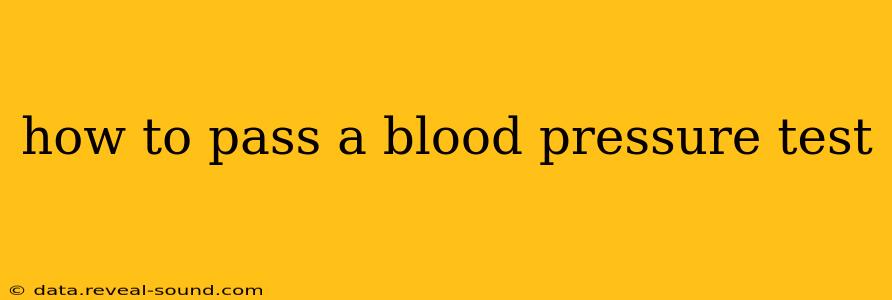High blood pressure, or hypertension, is a serious health concern, often requiring ongoing management. While this article focuses on how to achieve a lower reading during a blood pressure test, it's crucial to understand that this is only a snapshot of your health. Consistent healthy lifestyle choices are paramount for long-term blood pressure control. A single low reading doesn't negate the need for ongoing medical care if you have hypertension. Always consult your doctor for diagnosis and treatment.
What Affects Blood Pressure Readings?
Several factors can influence your blood pressure reading during a test, some temporary and some long-term. Understanding these factors can help you prepare for a test and manage your blood pressure effectively.
1. Anxiety and Stress:
Stress hormones released during anxiety can significantly elevate blood pressure readings. This is a common reason for elevated readings, particularly in individuals who are nervous about medical appointments.
2. Caffeine and Nicotine:
Both caffeine and nicotine act as stimulants, temporarily increasing heart rate and blood pressure. Avoid consuming these substances for at least 30 minutes before your appointment.
3. Food and Drink:
A full bladder or having recently consumed a large meal or high-sodium foods can influence readings. It's generally recommended to avoid eating or drinking anything for at least 30 minutes before the test.
4. Medication:
Certain medications can affect blood pressure. Inform your doctor about all medications you are currently taking, including over-the-counter drugs, herbal remedies, and supplements.
5. Physical Activity:
Vigorous exercise immediately before the test can elevate blood pressure. Allow for adequate rest before the test.
How to Prepare for a Blood Pressure Test for an Accurate Reading
The best way to "pass" a blood pressure test is to have healthy blood pressure consistently. However, you can take steps to minimize temporary fluctuations that might lead to an artificially high reading:
- Rest: Relax and take deep breaths before the test. Find a quiet spot to sit calmly for at least 10 minutes.
- Hydration: Drink plenty of water throughout the day, but avoid consuming large amounts immediately before the test.
- Avoid Stimulants: Refrain from caffeine and nicotine for at least 30 minutes before the test.
- Comfortable Environment: Ensure the testing environment is comfortable and not too cold or hot.
- Empty Bladder: Empty your bladder before the test to avoid any potential influence.
- Proper Posture: Sit with your back straight and feet flat on the floor during the test. Avoid talking or moving during the measurement.
What if My Blood Pressure is Consistently High?
If your blood pressure is consistently high, despite your preparation and healthy habits, it's crucial to consult your doctor. High blood pressure is a serious condition that can lead to various health complications if left untreated. Your doctor can diagnose the cause and recommend appropriate treatment options, including lifestyle modifications, medication, or a combination of both.
Addressing People's Specific Concerns:
How can I lower my blood pressure naturally before a blood pressure test?
While you cannot drastically lower chronically high blood pressure immediately before a test, following the preparation steps above—rest, avoiding stimulants, proper hydration—can help minimize temporary increases. Long-term natural ways to lower blood pressure include adopting a heart-healthy diet (low sodium, rich in fruits and vegetables), regular exercise, stress management techniques, and maintaining a healthy weight.
What are the common causes of high blood pressure?
High blood pressure can have several causes, including genetics, unhealthy lifestyle choices (high sodium diet, lack of exercise, smoking, excessive alcohol consumption), obesity, stress, and underlying medical conditions like kidney disease.
How often should I have my blood pressure checked?
The frequency of blood pressure checks depends on your individual health status and risk factors. Your doctor will advise you on how often you need to monitor your blood pressure.
Disclaimer: This information is for educational purposes only and should not be considered medical advice. Always consult with a qualified healthcare professional for any health concerns or before making any decisions related to your health or treatment.
